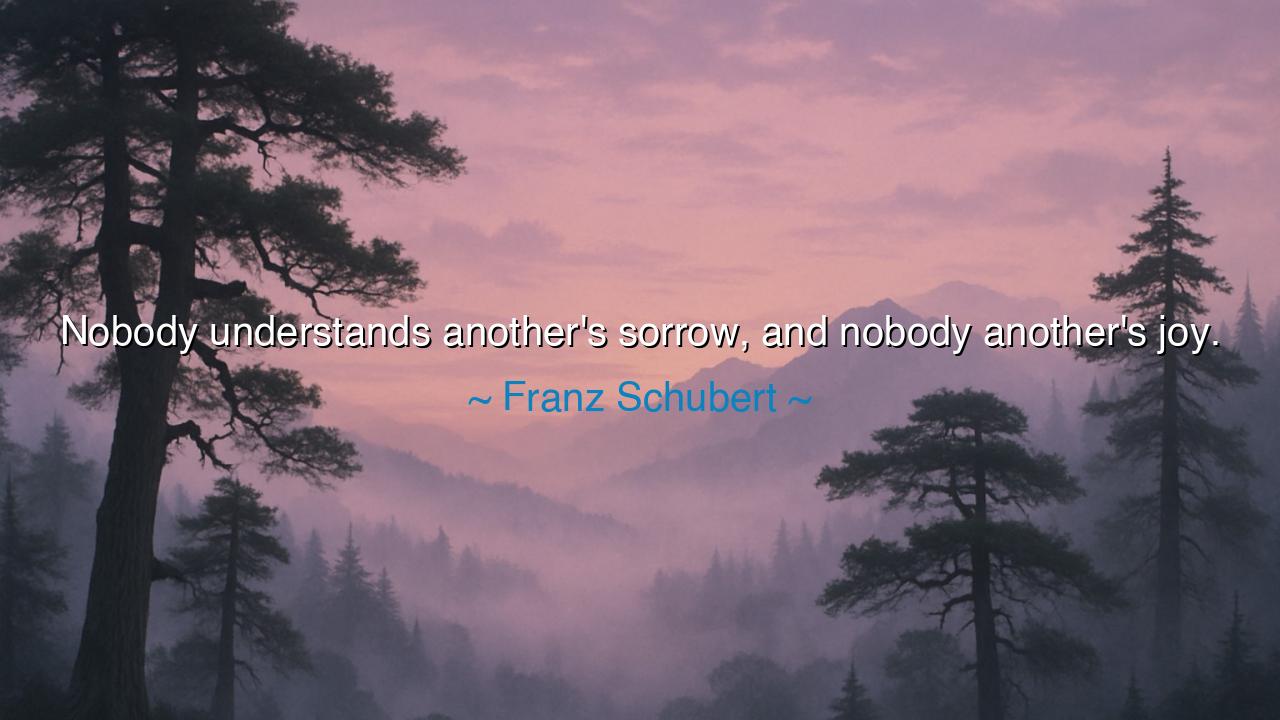
Nobody understands another's sorrow, and nobody another's joy.






“Nobody understands another’s sorrow, and nobody another’s joy.” — thus spoke Franz Schubert, the gentle genius whose music was born from both ecstasy and ache. In these words, he utters one of life’s most haunting truths: that the inner world of a soul can never be fully shared. Though we may love, though we may listen, the depths of emotion — whether of grief or of bliss — are known only to the one who feels them. Each heart beats in its own rhythm of pain and delight, and even when two hearts beat together, their songs remain distinct, separated by the invisible veil of individuality.
To the ancients, this truth was already known. The Greek philosopher Heraclitus taught that no man can step into the same river twice, for both he and the river are forever changing. So too, no two souls drink from the same cup of joy or sorrow in the same way. The joys of one are born of their own memories, their own longings, their own wounds. The sorrows of another flow from secret places where no other mind can enter. Schubert, who lived in loneliness and illness, understood this with piercing clarity. Though his music moved the world to tears, his own pain remained untranslatable, like a melody only he could hear in full.
When Schubert composed, he poured the language of emotion into his art — notes that weep, harmonies that sigh, crescendos that rise like the wings of a soul trying to escape the weight of existence. Yet even then, what he expressed could only be an echo of what he felt. Listeners could sense the sorrow, they could be moved by it, but they could not inhabit it. Just as no one else can taste the salt of another’s tears, no one can fully dwell within another’s joy. Empathy can bridge distances, but it cannot erase them. This is the bittersweet nature of human connection — we walk beside one another, but we can never completely merge.
Consider the story of Vincent van Gogh, whose paintings blaze with emotion. He saw beauty in ways that few could perceive, and pain that few could endure. When he painted his sunflowers, they were not mere flowers, but living flames — an expression of joy so fierce it burned. Yet those around him could not understand; they called him mad. His sorrow, too, was misunderstood, until it consumed him. Like Schubert, he revealed himself to the world, but the world could not fully see him. Both men remind us that the human soul is a mystery — luminous, solitary, and infinite in its depths.
But though Schubert’s words may seem sorrowful, they also hold a quiet dignity. For in this solitude lies the proof of individuality — the sacred truth that each heart is its own universe. Our inability to fully share another’s sorrow or joy is not a curse, but a testament to the uniqueness of every soul. No two lives are identical; no two stories unfold the same. Each of us carries an unseen world within, a private garden of laughter and tears. To live is to tend that garden, to know it deeply, and to respect that others are tending theirs in silence beside us.
Yet, even if we cannot fully understand another’s inner life, we can honor it. We can listen with reverence, speak with gentleness, and sit with compassion in the presence of another’s joy or pain. We can admit that words are poor vessels for the ocean of feeling, but that the gesture of understanding — the stillness, the shared gaze, the unspoken empathy — can bridge the distance between hearts. For though we cannot cross into another’s sorrow, we can stand at the edge of it, and let them know they are not alone.
So, my child, learn from Schubert’s lament this dual wisdom: cherish your inner life, for it is uniquely yours, and approach the inner lives of others with humility and care. Do not demand to be understood completely, nor despair when you are not. Instead, find peace in expressing your truth as best you can — through words, through art, through kindness. And when you behold another’s joy or grief, do not seek to own or solve it; simply honor its sacred mystery. For in the end, our inability to fully understand one another does not separate us — it unites us, as travelers who, though walking on separate paths, gaze upon the same eternal sky of human feeling.






AAdministratorAdministrator
Welcome, honored guests. Please leave a comment, we will respond soon